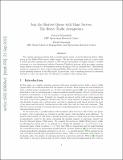Join the Shortest Queue with Many Servers. The Heavy-Traffic Asymptotics
Author(s)
Eschenfeldt, Patrick Clark; Gamarnik, David
Download1502.00999.pdf (367.7Kb)
OPEN_ACCESS_POLICY
Open Access Policy
Creative Commons Attribution-Noncommercial-Share Alike
Terms of use
Metadata
Show full item recordAbstract
We consider queueing systems with n parallel queues under a Join the Shortest Queue (JSQ) policy in the Halfin-Whitt heavy-traffic regime. We use the martingale method to prove that a scaled process counting the number of idle servers and queues of length exactly two weakly converges to a two-dimensional reflected Ornstein-Uhlenbeck process, while processes counting longer queues converge to a deterministic system decaying to zero in constant time. This limiting system is comparable to that of the traditional Halfin-Whitt model, but there are key differences in the queueing behavior of the JSQ model. In particular, only a vanishing fraction of customers will have to wait, but those who do incur a constant order waiting time. Keywords: queueing theory; parallel queues; diffusion models
Date issued
2018-02Department
Massachusetts Institute of Technology. Operations Research Center; Sloan School of ManagementJournal
Mathematics of Operations Research
Publisher
Institute for Operations Research and the Management Sciences (INFORMS)
Citation
Eschenfeldt, Patrick and David Gamarnik. “Join the Shortest Queue with Many Servers. The Heavy-Traffic Asymptotics.” Mathematics of Operations Research 43, 3 (August 2018): 867–886 © 2018 INFORMS
Version: Original manuscript
ISSN
0364-765X
1526-5471